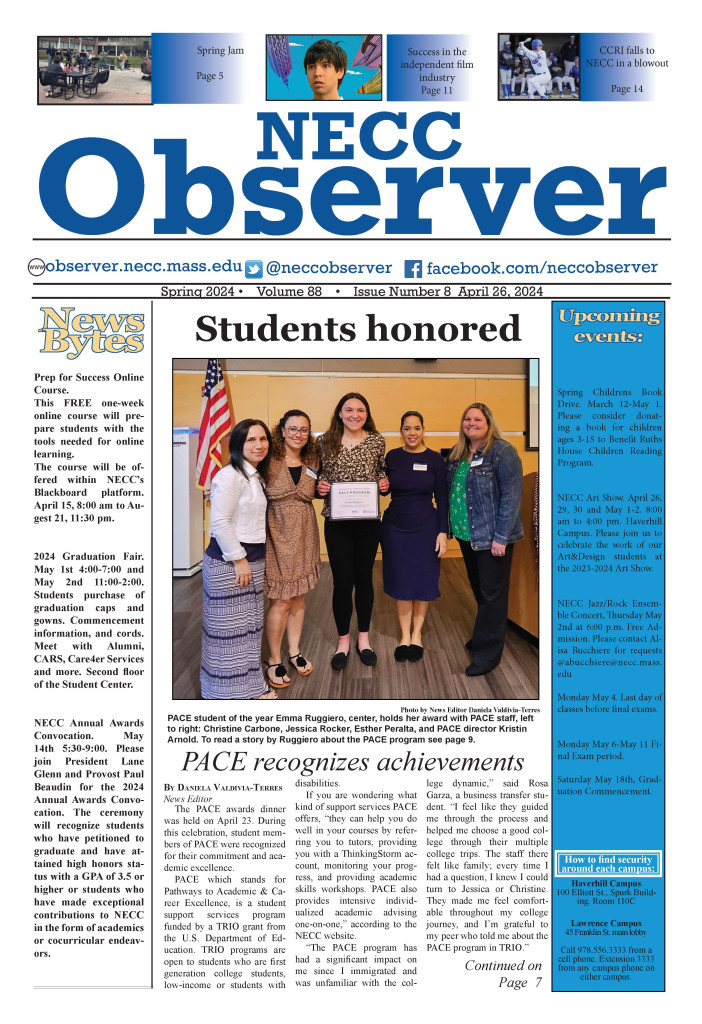NEADS to give presentation on the value and service of assistance dogs
Dogs are man’s best friend and can provide life changing services. An information session about NEADS and service dogs was held on November 14 in room SC 106 on the Haverhill campus. Kevin Lambert, an NECC alum and veteran, spoke to students to staff about how service dogs can impact people’s lives. According to Lambert, NEADS is an organization that pairs service dogs with people who need them. They have matched over 1,700 dogs and individually train them to perform tasks for an individual with a disability. “Service dogs give people independence and allow them to travel to places they might not be able to before,” Lambert said. Service dogs can help people in many different ways. They can alert people who are deaf if their keys fall while they are shopping. They can help calm someone down if they are having a panic attack. They can also alert others if the person is hurt or in danger.
According to the NEADS website, NEADS was started in 1976. They are one of two “Assistance Dog International” certified service dog programs in Massachusetts. The average cost of a service dog from when they are a puppy to when they are matched with a client is around $42,000. “We ask that clients pledge about $8,000, not out of pocket. It’s okay if you can’t pay that money, we just want to see that you are trying,” Lambert said. Veterans don’t have to pay for their service dogs. “Once your dog retires or passes away, we will replace it” Lambert added.
NEADS offers six different service dog programs their website said. Service dogs and facilitated service dogs for children assist people who have physical disabilities. They might need help picking up stuff or opening doors. These dogs are trained to open doors, retrieve objects from tables, and even switching on and off light switches. Hearing dogs assist people who are deaf or have some hearing loss. They can alert the person when the phone is ringing or if someone is calling the person’s name. Social dogs for children can assist children from ages 8-16.
The child might have a developmental disability like autism. These dogs are trained to match the needs of the child. Service dogs for veterans can help calm veterans with PTSD and help with any physical disabilities they might have.
According to the Northern Essex information sheet regarding service animals, Northern Essex usually allows service animals on campus. It is important to note that the Americans with Disabilities Act website states that “any organization that serves the public must allow service animals to accompany people with disabilities.” Anyone with a service animal is not required to register the animal with the college. They do not have to present any documentation of their disability, but can work with the Learning Accommodations Center.
They are encouraged to fill out the volunteer registration but are not required to.
Deborah Regan, the Associate Director of the Learning Accommodations Center has seen service dogs do good on campus. “[I saw] a dog help a student get around campus and help her feel safe.”
“I think service dogs help with safety which is always important!” said Cheyenne Huberdeau, a Biomedical Engineering student. “I think they can sometimes be a distraction though, at lease for me because I’m a huge dog lover. So seeing a dog at school [would] get my attention.”
Kevin Lambert is the program development administrator for NEADS and served in the United States army. He was an infantryman from 2005-2008 and completed over 600 combat patrols and missions in Iraq.
He got his associate degree in Science and Human Services from Northern Essex.
He also has a certificate in alcohol and drug abuse counseling. Lambert had a service dog at NECC to help him. Lambert swears by the program and encourages people to get more information about service dogs on the NEADS website.

